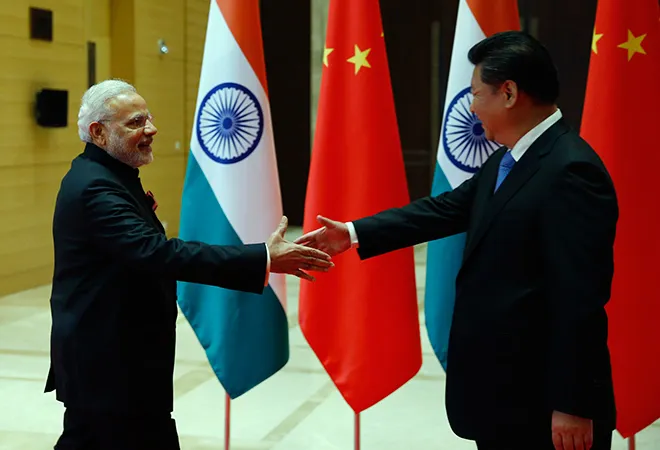-
CENTRES
Progammes & Centres
Location
There are clear limits to informal summitry, as India has found out since Wuhan. Despite all the rhetoric and symbolism on display at Mamallapuram, the substantive outcome remains clouded in mystery.

The setting was perfect. The spectacle was extravagant. The food was reportedly sumptuous. There were around five-and-half hours of one-on-one talks between Indian Prime Minister Narendra Modi and Chinese President Xi Jinping spread over two days. Modi welcomed Xi with all the warmth at his disposal. And, yet, the outcome was along predictable lines. Grand words, little else.
It was decided at the Mamallapuram ‘informal summit’ that a new mechanism would be set up for issues relating to trade and investment. The two leaders underscored the need for having a rules-based global trading system, as well as the importance of cooperating on important regional and global issues.
Radicalisation and terrorism were also discussed, and China raised the possibility of enhancing defence cooperation. People-to-people exchanges between the two countries got a push, with India announcing a five-year tourist e-visa with multiple entry facility for Chinese travellers.
While Modi suggested the start of a new era of cooperation between India and China on Saturday with the ‘Chennai Connect’, Xi said their ‘candid’, ‘heart-to-heart’ discussions on bilateral relations were ‘in-depth’ and ‘good’.
Modi is right in suggesting that the Wuhan summit in April 2018 led to increased stability in Sino-Indian relations, as strategic communication increased between the two sides. But at Wuhan, it was also decided that the two nations would prudently manage their differences, and will be sensitive about each other’s concerns. China’s behaviour vis-à-vis India since then has been hardly comforting. In fact, if anything, Beijing’s priorities have become clearer.
It should be apparent to New Delhi that China is now willing to bear significant costs diplomatically and politically to scuttle Indian interests. Beijing stood up for Pakistan at a forum like the United Nations Security Council (UNSC) even as it was largely isolated. This underscores the commitment China is making to its anti-India policy options.
It is important for India to engage China. And the informal summitry of the kind Modi has engaged in with Xi allows India to stand on par with its much more powerful neighbour and discuss issues in a setting where there is no pressure of deliverables.
The Wuhan summit last year did bring down the temperature after the high-decibel Dokalam crisis, and managed to steer the China-India relationship from an overtly conflictual stance. The Mamallapuram summit was also an attempt to take the Sino-Indian conversation away from the immediate divergences on Kashmir and Pakistan.
Broadening the conversation to cooperation on global issues and cultural exchanges manages to temporarily shield the relationship from the vagaries of structural challenges.
But there are clear limits to informal summitry, as India has found out since Wuhan. Despite all the rhetoric and symbolism on display at Mamallapuram, the substantive outcome remains clouded in mystery. There is no dearth of mechanisms in Sino-Indian engagement. But the results have been quite shallow. So, this talk of a new trade mechanism should also be taken with a pinch of salt.
The talk about cooperation on global issues is also becoming old hat. Cultural exchanges and enhancing people-to-people dialogue will do little to change public perceptions if Chinese policies vis-à-vis India do not alter in a positive direction. Much has been made out in sections of the media of no mention of the Kashmir issue during Modi-Xi talks.
But Xi had made his views perfectly clear a day before reaching India, and New Delhi, too, had responded. So what if no one belched at the table?
While Modi’s intent in proposing regular informal summit meetings with China is sound, the pomp and pageantry of such engagements can’t hide the fact that the Sino-Indian bilateral relationship has had not much to show for itself so far. And that’s a consequence of underlying structural realities shaping the engagement.
China is interested in shaping an alternative global order commensurate to its growing economic and military power. And India is a nation on China’s periphery whose rise it seeks to scuttle to secure its interests. Indian foreign policy has to effectively respond to this challenge.
In New Delhi, there is now a more realistic appraisal of China. Indian foreign policy has evolved in directions that demands reciprocity from Beijing. China is both India’s most important neighbour, and its most significant foreign policy challenge. India cannot ignore China, and it is cognisant of the growing power differential between the two.
But New Delhi, too, has its options, and over the last few years it has made it clear to Beijing that it’s not a pushover. From Dokalam to India’s opposition to China’s Belt and Road Initiative (BRI), India’s message has been clear: New Delhi will stand up for its vital interests. There is now less diffidence in carving out strategic partnerships with other like-minded countries.
In his departing statement, Xi suggested that “to achieve the ‘Dragon and Elephant Dance’ is the only correct choice for China and India, which is in the fundamental interests of both countries and their peoples”. While he has proposed a 100-year plan to cement ties between the two neighbours, he must recognise that for New Delhi, waiting for a century is not really an option.
Unless there is some tangible movement on key issues very soon, even the limited enthusiasm in New Delhi for the next summit in China will be very difficult to sustain.
This commentary originally appeared in The Economic Times.
The views expressed above belong to the author(s). ORF research and analyses now available on Telegram! Click here to access our curated content — blogs, longforms and interviews.

Professor Harsh V. Pant is Vice President – Studies and Foreign Policy at Observer Research Foundation, New Delhi. He is a Professor of International Relations ...
Read More +